Video
This Could Be The End…
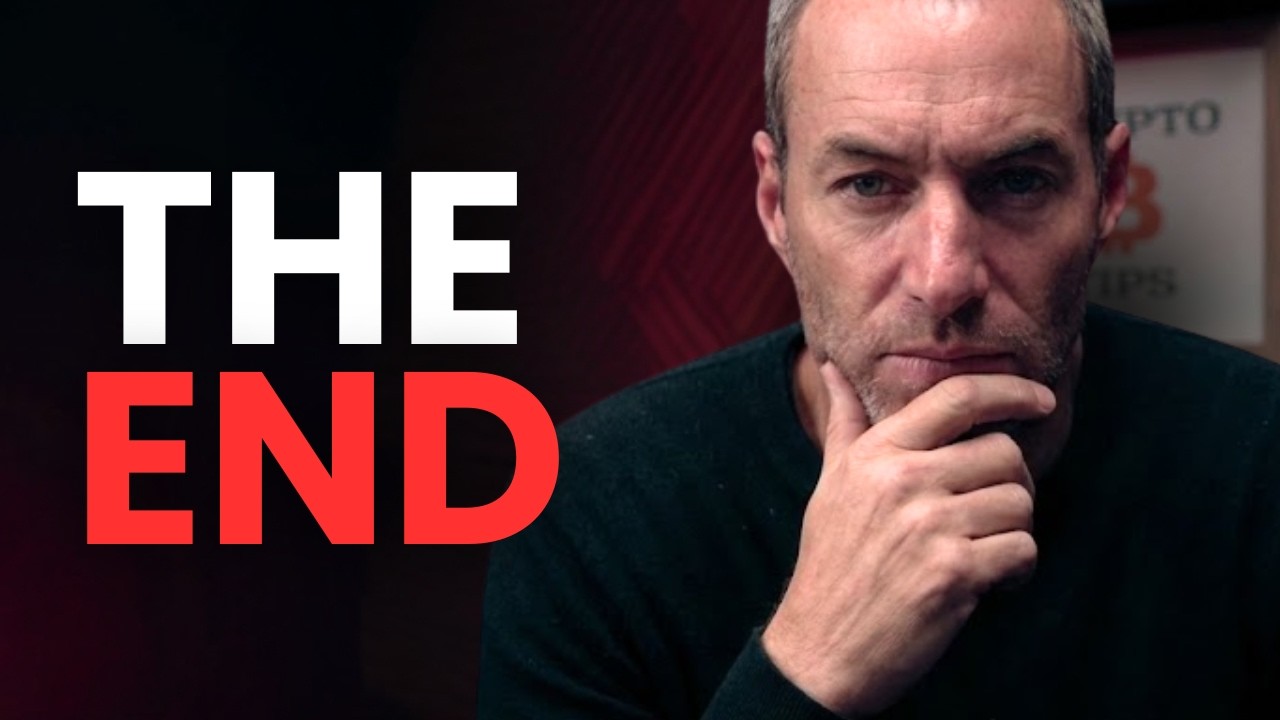
🚨 FREE NEWSLETTER: https://www.learningcrypto.com/
👕 SHOP: https://shop.learningcrypto.com
🕊️ SECOND CITIZENSHIPS: https://t.ly/LPQnW
📈 CLAIM $100 (+$30,000) FREE WITH BYBIT: https://partner.bybit.com/b/150821
🚀 GRAB 64% OFF PROTON VPN: https://go.getproton.me/SH1Ak
00:00 – Sentiment Now
01:55 – Bitcoin & Binance
03:48 – Panic Sellers
06:05 – Losses
#Btc #Bitcoin #Crypto #cryptonews #cryptocurrency #investing
source
Video
I’m Down 80% on My BIGGEST Crypto Bet… Here’s the Ugly Truth

I’m down over 80% on my biggest crypto bet, Ondo Finance—and I’m finally breaking down the uncomfortable truth behind it. In this video, I explain why “utility” often doesn’t matter as much as people think, what actually drives altcoin prices, and why Ondo’s situation reveals a much bigger issue affecting many crypto portfolios right now.
🔒 No BS Crypto Community
Join FREE 👉 https://www.nobscrypto.com.au/free
Membership 👉 https://www.nobscrypto.com.au/pricing
____________________________________________________________
💸 Crypto Deals (No KYC)
Bitunix – Up to $8,000 USDT 👉 https://www.bitunix.com/register?vipC…
Phemex – Earn $700+ 👉 https://phemex.com/a/k/NoBsCrypto1
Caleb & Brown (KYC Required) – Secure Crypto Broker 👉 https://calebandbrown.com/affiliates/…
____________________________________________________________
🔐 Security Essentials
Tangem Wallet 👉 https://tangem.com/pricing/?promocode…
NordVPN – From $3/month 👉 https://nordvpn.com/nobscrypto
____________________________________________________________
🚀 Follow Us
X 👉 https://x.com/noBScrypto
IG / TikTok 👉 @no_bscrypto
*THIS IS NOT FINANCIAL ADVICE. I AM NOT A FINANCIAL ADVISOR AND THIS IS PURELY FOR ENTERTAINMENT PURPOSES ONLY! Please consult your financial advisor BEFORE you make any investment decisions.
source
Video
The Brutal Truth of Bitcoin 2026 Crash
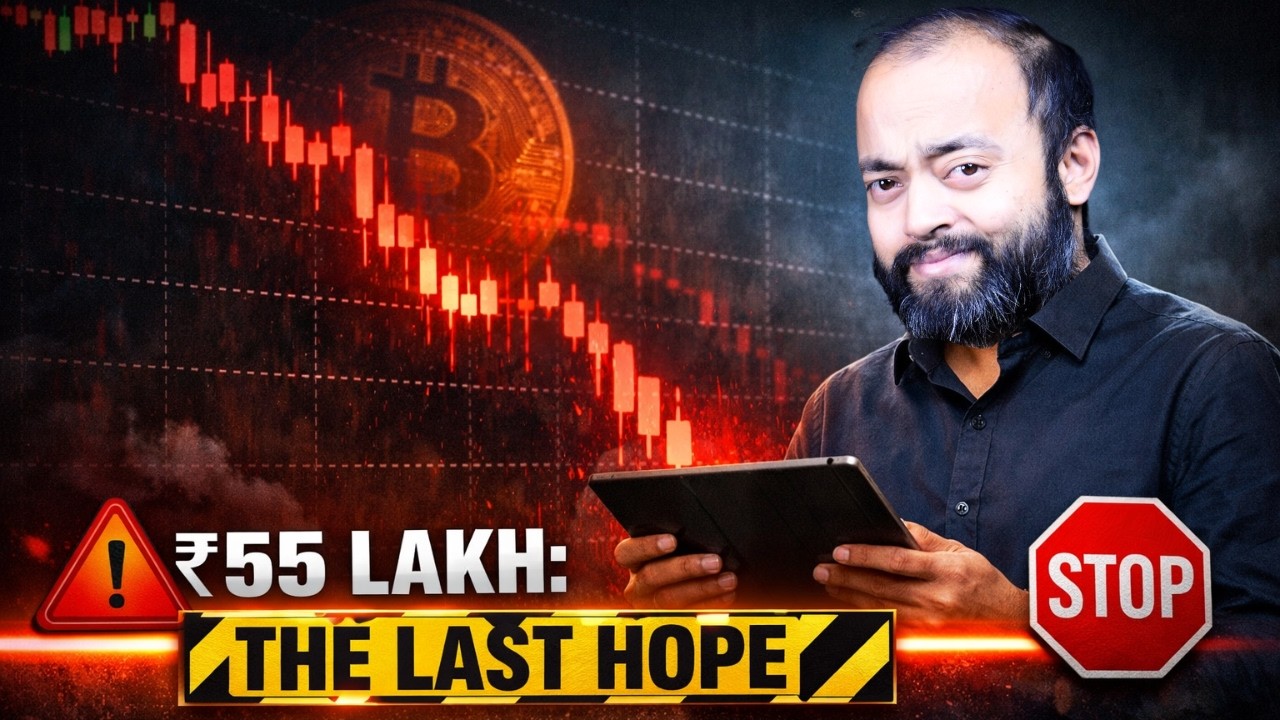
Link for Crypto Trading APP Link : https://www.delta.exchange/?code=HGGAXP
Bitcoin Crash 2026: What should Indian traders do now? The crypto market is witnessing a massive $200 Billion wipeout, with Bitcoin falling from its All-Time High of ₹1.14 Crore ($125k) to nearly ₹60 Lakh. Is this a healthy correction or the start of a brutal Crypto Winter?
In this video, we decode the “Triple Attack” on Bitcoin: The Federal Reserve’s new leadership under Kevin Warsh, the slowdown in institutional demand, and the global risk-off sentiment. We also discuss the specific impact on Indian Crypto Traders regarding the new 2026 tax reporting rules and the critical ₹55 Lakh support level. Whether you are a leverage trader, swing trader, or a long-term investor, this structure-based analysis will help you navigate the volatility without emotions. We cover price scenarios from ₹45 Lakh to ₹2 Crore and the biggest risks involved in 2026.
Don’t trade blindly! Understand the market structure first.
Comment below: Are you buying this dip or waiting for ₹50 Lakh?
Subscribe for daily crypto & finance updates in India.
Bitcoin Crash 2026, Bitcoin price prediction India, Crypto market crash today, Bitcoin news Hindi, Bitcoin latest update India, BTC price INR, Indian crypto tax 2026, Bitcoin support levels, Crypto trading for beginners India, Bitcoin ₹1 crore, Why is Bitcoin falling, Crypto winter 2026, Bitcoin vs Indian Rupee, Kevin Warsh Fed, Bitcoin institutional inflow, Crypto liquidation news, Bitcoin strategy for traders, India crypto regulations 2026, Bitcoin target 2026, Crypto news India today, Bitcoin analysis Hindi, Finance news India, Crypto investment 2026, Bitcoin ka bhav, Crypto me loss kaise recover karein.
source
Video
Financial Literacy important Que with Ans | All Courses 1st/2nd/3rd/4th Semester by Beeraj #finance

Join our WhatsApp Group – https://whatsapp.com/channel/0029Vb5Eo3m7T8bRYa0Gce2x
*Download PDF Notes Financial Literacy 👉*
*➤ Notes in Hindi -* https://superprofile.bio/vp/financial-literacy-semester—1-2-3-4th-b-a-prog—-hons–notes-in-hindi
*➤ Notes in English -* https://superprofile.bio/vp/financial-literacy-semester—1-2-3-4th-b-a-prog—-hons–notes-in-english
*📄 Reading Indian Fiction in English 👉* https://superprofile.bio/vp/reading-english-fiction-in-english-b-a-b-com-sem–1st-to-6th-notes-in-hindi
*📄 Theory and Practice of Democracy*
*➤ Notes in HINDI :-* https://superprofile.bio/vp/b-a-program-semester—3–theory-and-practice-of-democracy-notes-in-hindi
*➤ Notes in ENGLISH :* https://superprofile.bio/vp/b-a-program-semester—3–theory-and-practice-of-democracy-notes-in-english
*📄 Media in HIstory (इतिहास में मिडिया)👉*
*➤ Notes in HINDI :* https://superprofile.bio/vp/media-in-history-semester-3rd–b-a-prog—-hons-notes-in-hindi
*➤ Notes in ENGLISH :* https://superprofile.bio/vp/media-in-history-semester-3rd–b-a-prog—-hons-notes-in-english
*📄 हिंदी गद्य (क) : उद्भव और विकास 👉*
*➤ Notes –* https://superprofile.bio/vp/b-a-program-semester—3rd—4th-हिंदी-गद्य–क—-उद्भव-और-विकास-best-notes
*📄 ENGLISH : BUSINESS COMMUNICATION 👉*
*➤ Notes -* https://superprofile.bio/vp/b-a—3rd-semester-english—business-communication-notes
*📄 Indian Govt. and Politics (भारतीय शासन एवं राजनीति)👉*
*➤ Notes in HINDI :* https://superprofile.bio/vp/b-a-semester–2-political-science–indian-govt–and-politics-notes-in-hindi
*➤ Notes in ENGLISH :* https://superprofile.bio/vp/b-a-semester–2nd-pol–science—indian-govt–and-politics-notes-in-english
*📄 History of India 1550-1700 (भारत का इतिहास 1550-1700)👉*
*➤ Notes In HINDI -* https://superprofile.bio/vp/b-a-program-du-sol-semester—4-history-of-india-1550-1700-notes-in-hindi
➤ Notes In English – https://superprofile.bio/vp/b-a-program-du-sol-semester—4-history-of-india-1550-1700-notes-in-english
*📄 Comparative Government and Politics (तुलनात्मक शासन एवं राजनीति) 👉*
*➤ Notes In HINDI -* https://superprofile.bio/vp/b-a-program-du-sol-semester-4th–comparative-government—politics-in-hindi
*➤ Notes In English -* https://superprofile.bio/vp/b-a-program-du-sol-semester–4-comparative-government—politics-in-english
*📄 History of India 1200-1550 👉*
*➤ Notes in HINDI -* https://superprofile.bio/vp/b-a-program-semester—3—history-of-india-1200-1550-notes-in-hindi
*➤ Notes in ENGLISH -* https://superprofile.bio/vp/b-a-program-semester—3—history-of-india-1200-1550-notes-in-english
*📄 Ancient and Medieval Indian Political Thought (प्राचीन और मध्यकालीन भारतीय राजनीतिक विचार)👉*
*➤ Notes in HINDI :-* https://superprofile.bio/vp/b-a-sem–3rd—ancient-and-medieval-indian-political-thought-notes-in-hindi
*➤ Notes in ENGLISH :-* https://superprofile.bio/vp/b-a-sem–3—ancient-and-medieval-indian-political-thought-notes-in-english
*📄 Public Institutions In India (भारत मे सार्वजनिक संस्थान) 👉*
*➤ Notes In HINDI –* https://superprofile.bio/vp/b-a-program-du-sol-4th-semester-public-institutions-in-india-notes-in-hindi
*➤ Notes In English -* https://superprofile.bio/vp/b-a-program-du-sol-semester-4-public-institutions-in-india-notes-in-english
*📄 Education in India Policy and Practice- 👉*
*➤ Notes in Hindi -* https://superprofile.bio/vp/4th-semester-b-a-programe-education-in-india—policy-and-practice-in-hindi
*➤ Notes in English -* https://superprofile.bio/vp/4th-semester-b-a-prog–education-in-india—policy-and-practice-in-english
*📄 Environmental Science Theory into Practice-2 👉*
*➤ Notes in HINDI -* https://superprofile.bio/vp/b-a-sem—3-4-environmental-science-theory-into-practice-2-notes-in-hindi
*➤ Notes in ENGLISH -* https://superprofile.bio/vp/b-a-sem—3-4-environmental-science-theory-into-practice-2-notes-in-english
financial literacy semester 1 2 3 4, financial literacy 3rd semester, financial literacy ba 3rd semester, financial literacy vac 3rd semester, financial literacy bcom 3rd semester, du sol sem 3 financial literacy, financial literacy paper pattern sem 3, financial literacy important questions sem 3, financial literacy sem 4,
financial literacy semester 3,
financial literacy semester 3 one shot,
financial literacy semester 3 in hindi,
financial literacy semester 3 vac,
financial literacy semester 3 unit 1,
financial literacy semester 3 important questions,
financial literacy semester 3 one shot hindi medium,
financial literacy semester 3 numerical,
financial literacy semester 3rd,
financial literacy semester 3 previous year question paper,
financial literacy semester 3 playlist,
financial literacy semester 3 nep 2020,
financial literacy semester 3 paper,
bcom sem 3 financial literacy,
bcom sem 3 commerce financial literacy,
financial literacy sem 3 bcom hons,
financial literacy sem 3 bcom corner,
bcom sem 3 financial management,
source
Video
BEST Crypto Coins to Buy During Bitcoin Crash (500x potential)
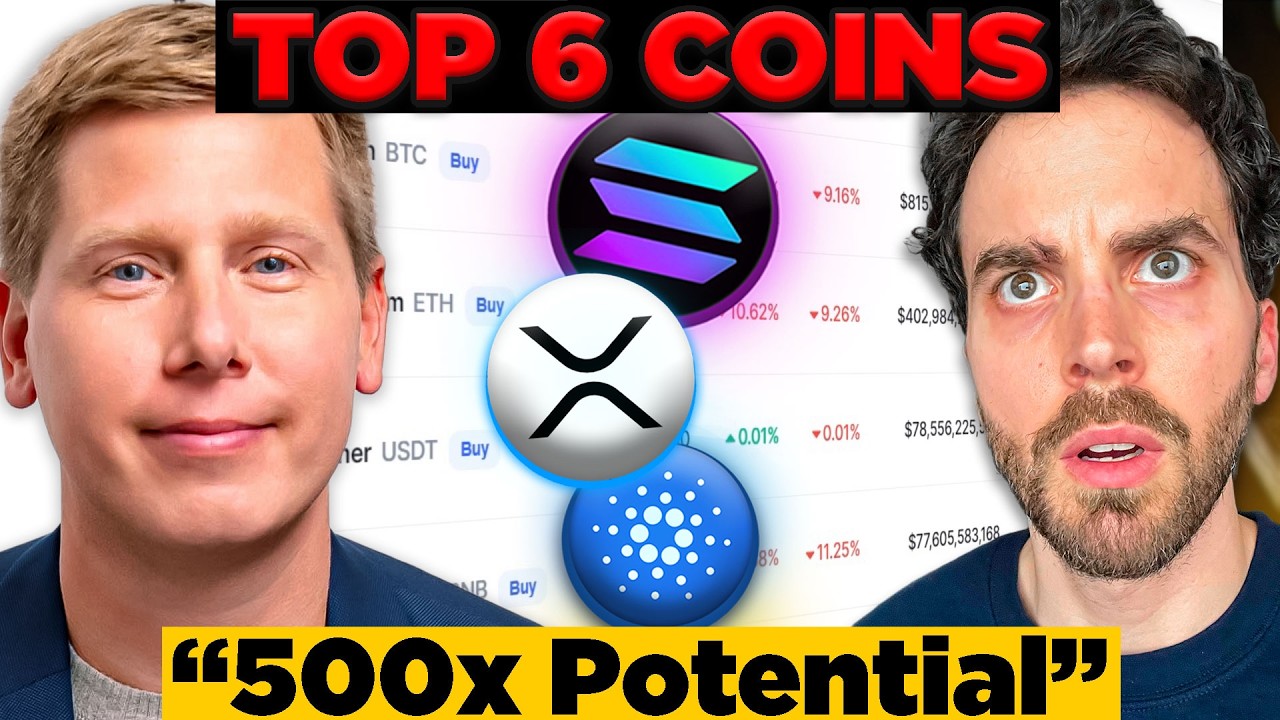
🟠 Join us at Bitcoin Conference 2026 Vegas!
Use code ‘ALTCOINDAILY’ for 10% off ticket: https://2026.b.tc
✅ Bitunix (no kyc, $10k bonus): https://www.bitunix.com/register?vipCode=AltcoinDaily
🟡 50% deposit bonus on first $100 (sign up on WEEX): https://www.weex.com/events/welcome-event?vipCode=oz5p&qrType=activity
🎁 Altcoin Daily Merch:
https://m046hz-bk.myshopify.com
🔵 Buy, Sell, & Trade Crypto on Coinbase:
https://advanced.coinbase.com/join/U5FN8P5
👉🔒 Get Ledger Wallet: Best Way to Keep your Crypto Safe!
https://www.ledger.com/?r=29fd4d75e9bc
🔴 Altcoin Daily in Spanish: https://www.youtube.com/@AltcoinDailyenEspanol
Follow Altcoin Daily on X: https://x.com/AltcoinDaily
Follow Altcoin Daily on Instagram: https://www.instagram.com/thealtcoindaily/
Video by Austin:
Follow Austin on Instagram: https://www.instagram.com/theaustinarnold/
Follow Austin on X: https://twitter.com/AustinArnol
TimeStamps:
00:00 Intro
01:03 Bitcoin Crash Explained
04:01 Top Crypto Coins (500x Potential)
***********************************************************************
#Bitcoin #Cryptocurrency #News #Ethereum #Invest #Metaverse #Crypto #Cardano #Binance #Chainlink #Polygon #Altcoin #Altcoins #DeFi #CNBC #Solana
***NOT FINANCIAL, LEGAL, OR TAX ADVICE! JUST OPINION! I AM NOT AN EXPERT! I DO NOT GUARANTEE A PARTICULAR OUTCOME I HAVE NO INSIDE KNOWLEDGE! YOU NEED TO DO YOUR OWN RESEARCH AND MAKE YOUR OWN DECISIONS! THIS IS JUST ENTERTAINMENT! USE ALTCOIN DAILY AS A STARTING OFF POINT!
Bitunix, WEEX, Binance are exchange partners for the channel.
*The channel is not responsible for the performance of sponsors and affiliates.
Disclosures of Material holdings:
Most of my crypto portfolio is Bitcoin, then Ethereum, but I hold many cryptocurrencies, possibly ones discussed in this video.
Material holdings over $5000 (in no particular order): BTC, ETH, SOL, MINA, DOT, SUPER, XCAD, LINK, INJ, BICO, METIS, SIS, BNB, PMX, LMWR, WMTx, HEART, TET, PAID, BORG, COTI, ADA, ONDO, ESE, ZKL, SUPRA, CELL, CTA, COOKIE, RSC, ATH, TAO.
Altcoin Daily is an ambassador for XBorg, Supra, WMTx.
This information is what was found publicly on the internet. This information could’ve been doctored or misrepresented by the internet. All information is meant for public awareness and is public domain. This information is not intended to slander harm or defame any of the actors involved but to show what was said through their social media accounts. Please take this information and do your own research.
bitcoin, cryptocurrency, crypto, altcoins, altcoin daily, blockchain, best investment, top altcoins, altcoin, ethereum, best altcoin buys, bitcoin crash, xrp, cardano, 2026, ripple, buy bitcoin, buy ethereum, bitcoin prediction, cnbc crypto, bitcoin crash, cnbc, crypto news, crypto crash, crypto expert, best crypto, crypto today, bitcoin price, bitcoin crash, bitcoin ta, crypto buy now, crypto expert, bloomberg crypto, ethereum news, trading crypto, clarity act, crypto crash, barry silbert, top altcoins, best altcoins, 500x, bittensor, solana vs ethereum,
source
Video
Here’s how bad income inequality actually is in America! #money #finance #incomeinequality #economy
Video
XRP PRICE RISES BUT WE ARE NOT BACK YET! – IS RETAIL OUT OF CRYPTO – DON’T PRICE YOUR XRP IN USD
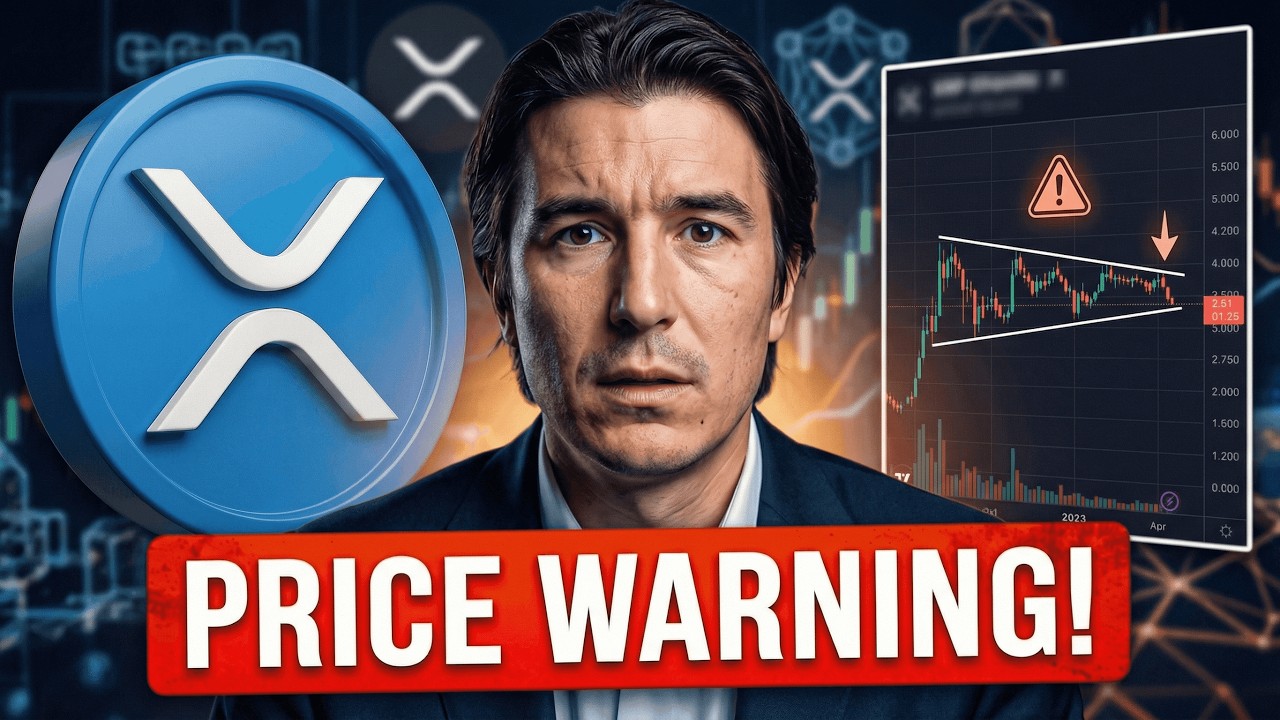
XRP PRICE RISES BUT WE ARE NOT BACK YET! – IS RETAIL OUT OF CRYPTO – DON’T PRICE YOUR XRP IN USD
NEW OFFICIAL CSC CRYPTO SHOP IS HERE:
https://officialcryptoshop.com/
⭐ FOLLOW ME ON X – https://x.com/TheCSCrypto ⭐
This video is about XRP. This video is about XRP and Ripple. Huge XRP update you need to see.
XRP Update, Ripple Update, Ripple XRP News: Latest News
⭐DCENT WALLET EXCLUSIVE DISCOUNTS ⭐
Wallet – https://store.dcentwallet.com/products/biometric-wallet-affiliates?bg_ref=Ka4GjOgJZa&utm_source=youtube&utm_medium=affiliate&utm_campaign=yt_CommonSenseCryptoYT_v01
2 Pack Wallet – https://store.dcentwallet.com/products/biometric-wallet-2x-package-affiliates?bg_ref=Ka4GjOgJZa&utm_source=youtube&utm_medium=affiliate&utm_campaign=yt_CommonSenseCryptoYT_v01
All in One Card – https://store.dcentwallet.com/products/all-in-one-card-wallet-backup-card-package-affiliates?bg_ref=Ka4GjOgJZa&utm_source=youtube&utm_medium=affiliate&utm_campaign=yt_CommonSenseCryptoYT_v01
⭐$1,000 SIGN UP BONUS ON MEXC: https://bit.ly/3P8NBq7⭐
Hey, I am Rich from Common Sense Crypto, bring you crypto news & information regarding the cryptocurrency market. The content on my channel will focus on news, common sense, insights and overall guides regarding XRP, Bitcoin, Ethereum, HBAR, & various altcoins.
DISCLAIMER: I am not a financial adviser, & all information given in my videos or on my social media platforms is for entertainment purposes only and is not financial advice.
Description Tags (Ignore)
#xrp #ripple #crypto
source
Video
Elmo Saves Money! #sesamestreet
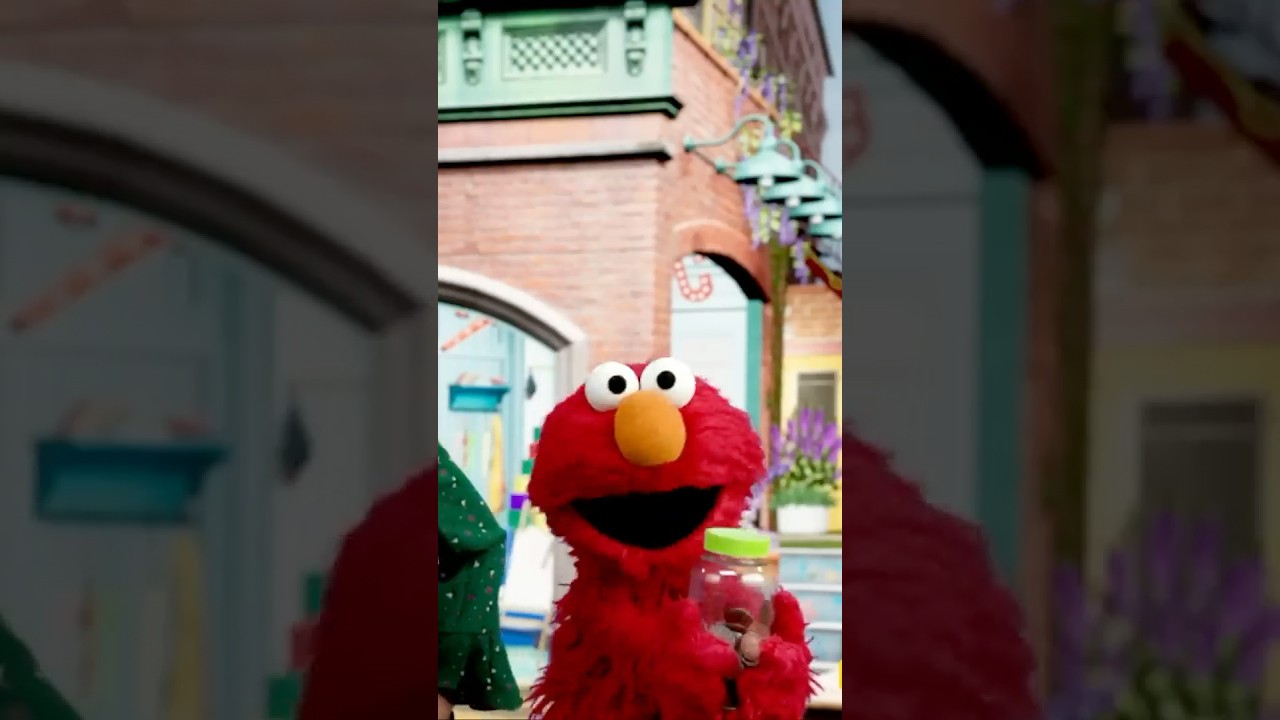
Learning about money and finances is more than understanding dollars and cents! We have resources to support children and families in taking the first steps towards building strong financial habits – for today and for the future. Learn more: https://sesame.org/FinancialEd
————————————————————–
Sesame Workshop is the global impact nonprofit behind Sesame Street and so much more. For over 50 years, we have worked at the intersection of education, media, and research, creating joyful experiences that enrich minds and expand hearts, all in service of empowering each generation to build a better world. Our beloved characters, iconic shows, outreach in communities, and more bring playful early learning to families in more than 150 countries and advance our mission to help children everywhere grow smarter, stronger, and kinder.
Learn more at: https://sesameworkshop.org
source
Video
Bitcoin Investors…This Doesn’t Look Good

🎯 Predict Crypto, Sports, Politics & More on *ClashPicks* ► https://www.clashpicks.com/
🐤 Follow ClashPicks’ X ► https://x.com/ClashPicks
**Exchange Partners**
🟩Bitunix Exchange ► *$100,000 Deposit Bonus* ► https://bit.ly/3Tmp1Hq
🟦BTCC Exchange ► *10% Deposit Bonus* ► https://bit.ly/4kk20Qa
**Crypto Pulse**
🟧CryptoPulse Trading Discord ► https://discord.com/invite/georgeplaysclash
🐤Follow CryptoPulse’s X For Trade Setups ► https://x.com/CryptoPulse_CRU
**Clash**
🖥️Check Out *Clash’s Website* ► https://georgeplaysclashroyale.com/
💜Join *Clash Discord* ► https://discord.com/invite/georgeplaysclash
🕹️Join *Clash’s Weekly Tournaments* ► https://georgeplaysclashroyale.com/tournament
📱GeorgePlaysClashRoyale YouTube ► https://www.youtube.com/@Georgeplaysclashroyale
📱GeorgePlaysClashRoyale TikTok ► http://tiktok.com/@georgeplaysclashroyale
🐤GeorgePlaysClashRoyale (For Clash) ► https://x.com/GeorgePlayClash
✅Buy $Clash Here ► https://georgeplaysclashroyale.com/buy
✅Clash CA: 6nR8wBnfsmXfcdDr1hovJKjvFQxNSidN6XFyfAFZpump
🔴Full Disclaimer: This video and its contents are for informational purposes only and do not constitute an offer to sell or trade, a solicitation to buy, or recommendation for any security, cryptocurrency, or related product, nor does it constitute an offer to provide investment advice or other related services by CryptosRUs. CryptosRus may have a financial investment with the cryptocurrencies discussed in this video. In preparing this video, no individual financial or investment needs of the viewer have been taken into account nor is any financial or investment advice being offered. Any views expressed in this video were prepared based upon the information available at the time such views were written. Changed or additional information could cause such views to change.
source
Video
Biggest Crypto News Happening Now!! [BlackRock + Joe Rogan + Ethereum]
![Biggest Crypto News Happening Now!! [BlackRock + Joe Rogan + Ethereum]](https://wordupnews.com/wp-content/uploads/2026/02/1771127665_maxresdefault.jpg)
BlackRock + Joe Rogan + Ethereum.. Biggest Crypto News Happening Now!!
🟠 Become a channel member & get access to perks:
https://www.youtube.com/channel/UCbLhGKVY-bJPcawebgtNfbw/join
⭐ Follow Altcoin Daily on 𝕏: https://twitter.com/AltcoinDaily
🎁 Altcoin Daily Merch: https://m046hz-bk.myshopify.com
🟡 50% deposit bonus on first $100 on WEEX: https://www.weex.com/events/welcome-event?vipCode=oz5p&qrType=activity
🟣 Best Crypto Exchange To Trade ($12,000 Bonus): https://www.coinw.com/en_US/register?r=ALTCOINDAILY
✅ Bitunix (no kyc, $10,000 bonus): https://www.bitunix.com/register?vipCode=AltcoinDaily
🔴 $30k USDT bonus with Phemex with our link: https://phemex.com/a/k/ALTCOINDAILY30
🔵 $30k bonuses with our link – Buy & Trade Crypto on Bybit: https://partner.bybit.com/b/altcoindaily
🟢 $8k bonus on Bitget Exchange with our link: https://bonus.bitget.com/AltcoinDaily
Altcoin Daily in Spanish: www.youtube.com/@AltcoinDailyenEspanol
Follow Altcoin Daily:
www.twitter.com/AltcoinDaily
www.instagram.com/thealtcoindaily/
Join Altcoin Daily on Telegram: https://t.me/AltcoinDailyANN
Hit Like, Share, and Subscribe for more daily cryptocurrency news
Altcoin Daily, the best cryptocurrency news media online!
Video by Aaron:
www.instagram.com/aarontarnold/
www.twitter.com/aarontarnold
For business inquires email: info.altcoindailyio@gmail.com
Timestamps:
0:00 – Huge BlackRock Crypto News (intro)
1:32 – 80% Bitcoin falls below $60k
2:06 – Insider reveals what’s going on behind scenes
3:07 – BlackRock Eth/Uniswap News (MEANS THIS)
5:00 – What comes Next?
6:00 – Michael Saylor BIG Prediction
6:29 – Joe Rogan to host CZ on podcast to talk crypto?
9:12 – final thoughts
**Note: My overall opinion is that the name of the game is to accumulate as much Bitcoin as possible. Alts are interesting but a lot more speculative. I use them to accumulate more Bitcoin & Ethereum.
***********************************************************************
🏺Support The Channel!!🏺(We Get A Kickback From Affiliate Links)
Protect and store your crypto with a Ledger Nano:
https://shop.ledger.com/?r=4b0f6c5711dc
Robinhood exchange has crypto & stocks:
https://join.robinhood.com/aarona-78df3a8
***********************************************************************
Altcoin Daily, the best cryptocurrency news media online!
#bitcoin #cryptocurrency #news #btc #ethereum #eth #cryptocurrency #litecoin #altcoin #altcoins #forex #money #best #trading #bitcoinmining #invest #trader #cryptocurrencies #top #investing #business #success #investment #finance #coinbase #binance #stocks #wallstreet #investor #wealth #bullish #crash #collapse #economy #cnbc #cryptolive #altcoindaily
***NOT FINANCIAL, LEGAL, OR TAX ADVICE! JUST OPINION! I AM NOT AN EXPERT! I DO NOT GUARANTEE A PARTICULAR OUTCOME I HAVE NO INSIDE KNOWLEDGE! YOU NEED TO DO YOUR OWN RESEARCH AND MAKE YOUR OWN DECISIONS! THIS IS JUST EDUCATION & ENTERTAINMENT! USE ALTCOIN DAILY AS A STARTING OFF POINT!
This is NOT an offer to buy or sell securities.
Investing and trading in cryptocurrencies is very risky, as anything can happen at any time.
This information is what was found publicly on the internet. This information could’ve been doctored or misrepresented by the internet. All information is meant for public awareness and is public domain. This information is not intended to slander, harm or defame any of the actors involved but to show what was said through their social media accounts. Please take this information and do your own research.
*The channel is not responsible for the performance of sponsors and affiliates.
Most of my crypto portfolio is Bitcoin, then Ethereum, but I hold many cryptocurrencies, possibly ones discussed in this video.
cryptocurrency, crypto, altcoin, altcoin daily, news, best investment, top altcoins, best crypto investment, ethereum, xrp, crash, crash, price, prediction, podcast, interview, finance, stock, investment, too late, bitcoin, cryptocurrency news, bitcoin news, cryptocurrency news media online, best crypto investments, 2026 prediction, should I buy ethereum?, blackrock, donald trump, coin bureau, binance, coinbase, trading crypto, trade, make money, cryptosrus, bitcoin today, bitcoin cnbc, altcoin news,
source
Video
PARKOUR VS MONEY HEIST 33!

#PARKOUR #BELLACIAO #LACASADEPAPEL #ESCAPE #POLICE #MONEY #HEIST #MONEYHEIST
Parkour is a training discipline using movement that developed from military obstacle course training.
NOTE:
We made this video for entertainment purposes this video is not real this video is a short film/movie/sketch, the Parkour/Freerunning in this video was performed in a safe environment by professional athletes, we’ve been doing this type of sport for more than 9 years, thank you for understanding👍
______________________________________________________________
Practitioners aim to get from one point to another in a complex environment, without assistive equipment, and in the fastest and most efficient way possible. Parkour includes running, climbing, swinging, vaulting, jumping, rolling, quadrupedal movement (crawling), and other movements as deemed most suitable for the situation.
Parkour’s development from military training gives it some aspects of non-combative martial art.
______________________________________________________________
Subscribe: https://www.youtube.com/channel/UCCOIESyMbbWwsR_MBuczDwA?view_as=subscriber
Instagram: https://www.instagram.com/thunderfreerunning
Facebook: https://web.facebook.com/ThunderFreerunning
Twitter: https://twitter.com/ThunderFreerun
______________________________________________________________
OG members:
“Cobra” Hazim Fatani: https://www.instagram.com/hazimfatani/
Bassam Fatani: https://www.instagram.com/parkour_fatani
Will Fatani: https://www.instagram.com/willpkfatani/
______________________________________________________________
New members:
Ray rn: https://www.instagram.com/ray_kung786/
Fit – Fix Nine Roxy: https://www.instagram.com/fixx.nineroxy/
Sidik: https://www.instagram.com/assiidiik/
Fikri: https://www.instagram.com/_.bng._10/
Fi Daree: https://www.instagram.com/fidaree_45/
Abdulhafit Fit: https://www.instagram.com/arwaedamae/
Abdulhakim Kim: https://www.instagram.com/kimmybts/
Hung : https://www.instagram.com/hu_ng2705/
PU PER: https://www.instagram.com/pu_per1/
Nurdeen: https://www.instagram.com/nurdeen._/
______________________________________________________________
Special thanks:
Buk: https://www.instagram.com/buk_.17/
Arfan Damae: https://www.instagram.com/arfan_damae6/
Mukhlis Arwae: https://www.facebook.com/profile.php?id=100046990671133&mibextid=LQQJ4d
______________________________________________________________
Tense Cinematic NoCopyright Background Music / BlackMail by soundridemusic
Credits:
Music: BlackMail by Soundridemusic
Link to Video: https://www.youtube.com/watch?v=7od843ArgnE
• Cinematic Trailer Teaser NoCopyright Background Music / Adrenaline by Soundridemusic
Artist: Soundridemusic
Credits:
Music: Adrenaline by Soundridemusic
Link to Video: https://www.youtube.com/watch?v=K1twNzIqBfY
• Cinematic Trailer Teaser NoCopyright Background Music / Adrenaline by Soundridemusic
Artist: Soundridemusic
Credits:
Music: Final Chase by Soundridemusic
Link to Video: https://www.youtube.com/watch?v=qnsRgxfZUSQ
• Epic Chase Tension No Copyright Background Music by Soundridemusic
Artist: Soundridemusic
Credits:
Music: Dark Investigation by Soundridemusic
Link to Video: https://www.youtube.com/watch?v=M-vazrsRALg
• NoCopyright Dark Tension Thriller Music for Video / Dark Investigation by soundridemusic
Credits:
Music: Dark City by Soundridemusic
Link to Video: https://www.youtube.com/watch?v=ILyfR-GLm-A&t=105s
• Cinematic Suspense Trailer NoCopyright Music for Video / Dark City by Soundridemusic
► Support the Soundridemusic and enjoy exclusive perks by becoming a member:
/ @soundridemusic
► SUPPORT me on Patreon: https://www.patreon.com/soundridemusic
/ soundridemusic :
• to use music without credits;
• to get early access to music that is not on YouTube;
• to get high-quality wave file downloads;
• to download all my content with one link.
FOLLOW Soundridemusic
Instagram: https://www.instagram.com/soundridemusic/
/ soundridemusic
TikTok: https://www.tiktok.com/@soundridemusic
LISTEN to Soundridemusic on STREAMING
• Spotify: https://open.spotify.com/artist/1MxHcId848nwUHNLK03SOd
• Apple: https://music.apple.com/us/artist/soundridemusic/1623593908
• Amazon: https://www.amazon.com/music/player/artists/B0B1332NRT/soundridemusic
• SoundCloud: https://soundcloud.com/soundridemusic
• Deezer: https://www.deezer.com/en/artist/16940875
source
-

 Politics6 days ago
Politics6 days agoWhy Israel is blocking foreign journalists from entering
-
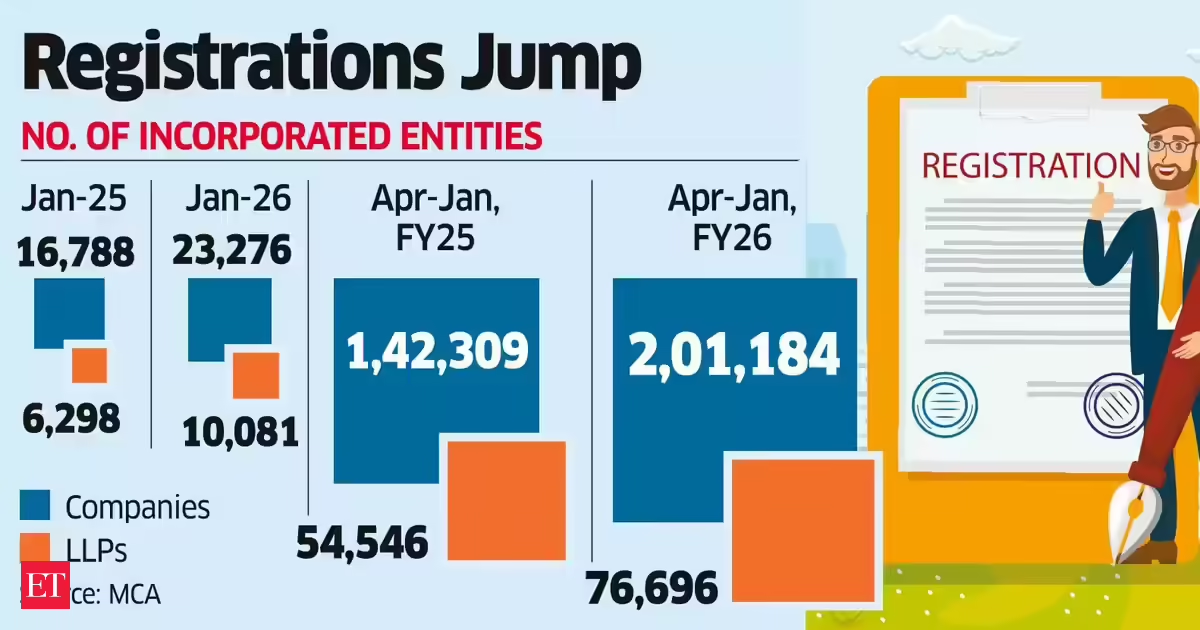
 Business6 days ago
Business6 days agoLLP registrations cross 10,000 mark for first time in Jan
-

 Sports3 days ago
Sports3 days agoBig Tech enters cricket ecosystem as ICC partners Google ahead of T20 WC | T20 World Cup 2026
-

 NewsBeat5 days ago
NewsBeat5 days agoMia Brookes misses out on Winter Olympics medal in snowboard big air
-

 Business6 days ago
Business6 days agoCostco introduces fresh batch of new bakery and frozen foods: report
-

 Tech4 days ago
Tech4 days agoSpaceX’s mighty Starship rocket enters final testing for 12th flight
-

 NewsBeat6 days ago
NewsBeat6 days agoWinter Olympics 2026: Team GB’s Mia Brookes through to snowboard big air final, and curling pair beat Italy
-

 Sports6 days ago
Sports6 days agoBenjamin Karl strips clothes celebrating snowboard gold medal at Olympics
-

 Video2 days ago
Video2 days agoThe Final Warning: XRP Is Entering The Chaos Zone
-

 Tech3 hours ago
Tech3 hours agoLuxman Enters Its Second Century with the D-100 SACD Player and L-100 Integrated Amplifier
-

 Politics7 days ago
Politics7 days agoThe Health Dangers Of Browning Your Food
-

 Business7 days ago
Business7 days agoJulius Baer CEO calls for Swiss public register of rogue bankers to protect reputation
-
![Heathrow has said passenger numbers were 60% lower in November than before the coronavirus pandemic and there were “high cancellations” among business travellers concerned about being trapped overseas for Christmas as Omicron spreads. The UK’s largest airport said the government’s travel restrictions had dealt a fresh blow to travel confidence and predicted it was likely to take several years for passenger numbers to return to pre-pandemic levels. This week ministers said passengers arriving in the UK would have to take a pre-departure Covid test, as well as a post-flight test, because of fears about the spread of the new variant. “[The] high level of cancellations by business travellers concerned about being trapped overseas because of pre-departure testing shows the potential harm to the economy of travel restrictions,” the airport said in an update. Heathrow said the drop in traveller confidence owing to the new travel restrictions had negated the benefit of reopening the all-important corridor to North America for business and holiday travel last month. Eleven African countries have been added to the government’s red list, requiring travellers to quarantine before reuniting with families. “By allowing Brits to isolate at home, ministers can make sure they are reunited with their loved ones this Christmas,” said John Holland-Kaye, the chief executive of Heathrow. “It would send a strong signal that restrictions on travel will be removed as soon as safely possible to give passengers the confidence to book for 2022, opening up thousands of new jobs for local people at Heathrow. Let’s reunite families for Christmas.” Heathrow said that if the government could safely signal that restrictions would be lifted soon, then employers at Heathrow would have the confidence to hire thousands of staff in anticipation of a boost in business next summer. The airport is expecting a slow start to 2022, finishing next year with about 45 million passengers – just over half of pre-pandemic levels. This week Tui, Europe’s largest package holiday operator, said it expected bookings for next summer to bounce back to 2019 levels. However, Heathrow said on Friday not to expect the aviation industry to recover for several years. “We do not expect that international travel will recover to 2019 levels until at least all travel restrictions (including testing) are removed from all the markets that we serve, at both ends of the route, and there is no risk of new restrictions, such as quarantine, being imposed,” the airport said.](https://wordupnews.com/wp-content/uploads/2026/02/shutterstock_1100012546-scaled-400x240.jpg)
![Heathrow has said passenger numbers were 60% lower in November than before the coronavirus pandemic and there were “high cancellations” among business travellers concerned about being trapped overseas for Christmas as Omicron spreads. The UK’s largest airport said the government’s travel restrictions had dealt a fresh blow to travel confidence and predicted it was likely to take several years for passenger numbers to return to pre-pandemic levels. This week ministers said passengers arriving in the UK would have to take a pre-departure Covid test, as well as a post-flight test, because of fears about the spread of the new variant. “[The] high level of cancellations by business travellers concerned about being trapped overseas because of pre-departure testing shows the potential harm to the economy of travel restrictions,” the airport said in an update. Heathrow said the drop in traveller confidence owing to the new travel restrictions had negated the benefit of reopening the all-important corridor to North America for business and holiday travel last month. Eleven African countries have been added to the government’s red list, requiring travellers to quarantine before reuniting with families. “By allowing Brits to isolate at home, ministers can make sure they are reunited with their loved ones this Christmas,” said John Holland-Kaye, the chief executive of Heathrow. “It would send a strong signal that restrictions on travel will be removed as soon as safely possible to give passengers the confidence to book for 2022, opening up thousands of new jobs for local people at Heathrow. Let’s reunite families for Christmas.” Heathrow said that if the government could safely signal that restrictions would be lifted soon, then employers at Heathrow would have the confidence to hire thousands of staff in anticipation of a boost in business next summer. The airport is expecting a slow start to 2022, finishing next year with about 45 million passengers – just over half of pre-pandemic levels. This week Tui, Europe’s largest package holiday operator, said it expected bookings for next summer to bounce back to 2019 levels. However, Heathrow said on Friday not to expect the aviation industry to recover for several years. “We do not expect that international travel will recover to 2019 levels until at least all travel restrictions (including testing) are removed from all the markets that we serve, at both ends of the route, and there is no risk of new restrictions, such as quarantine, being imposed,” the airport said.](https://wordupnews.com/wp-content/uploads/2026/02/shutterstock_1100012546-scaled-80x80.jpg) Business6 days ago
Business6 days agoWeight-loss jabs threaten Greggs’ growth, analysts warn
-
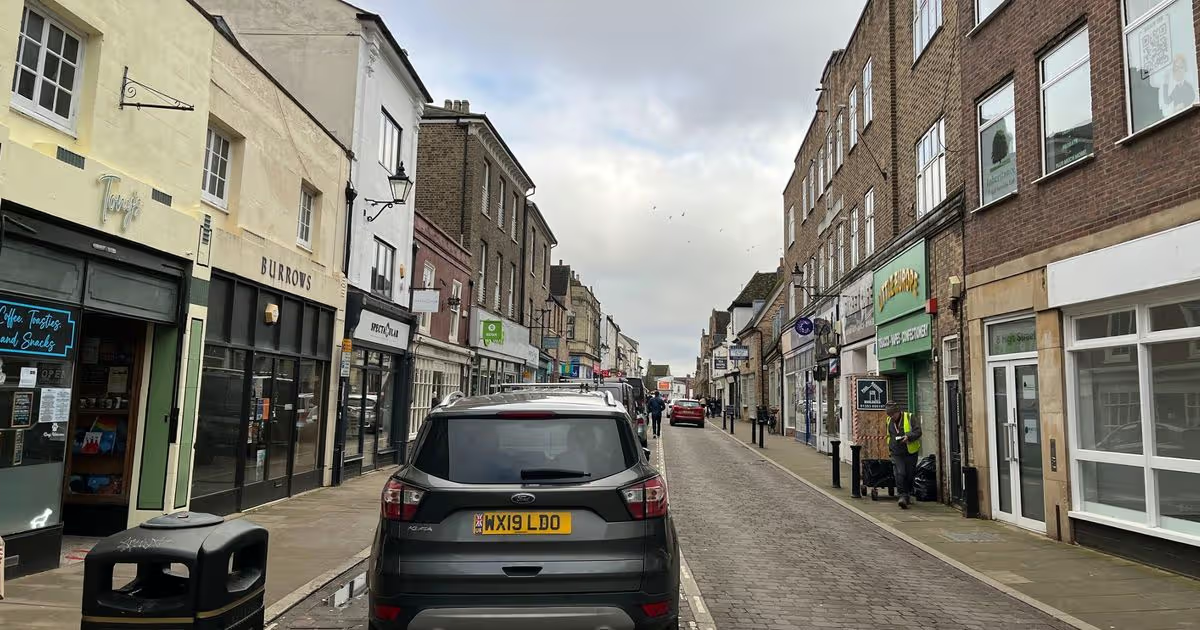
 NewsBeat6 days ago
NewsBeat6 days agoResidents say city high street with ‘boarded up’ shops ‘could be better’
-

 Crypto World3 days ago
Crypto World3 days agoPippin (PIPPIN) Enters Crypto’s Top 100 Club After Soaring 30% in a Day: More Room for Growth?
-
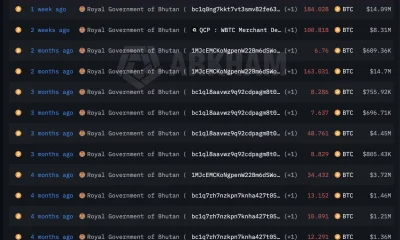
 Crypto World1 day ago
Crypto World1 day agoBhutan’s Bitcoin sales enter third straight week with $6.7M BTC offload
-

 Crypto World5 days ago
Crypto World5 days agoBlockchain.com wins UK registration nearly four years after abandoning FCA process
-

 Crypto World5 days ago
Crypto World5 days agoU.S. BTC ETFs register back-to-back inflows for first time in a month
-

 Video3 days ago
Video3 days agoPrepare: We Are Entering Phase 3 Of The Investing Cycle
-
Sports5 days ago
Kirk Cousins Officially Enters the Vikings’ Offseason Puzzle








